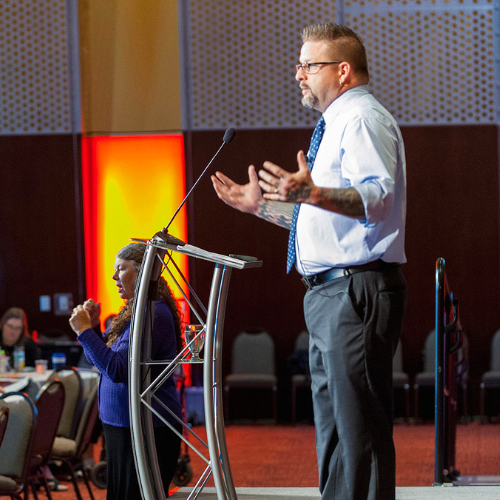Kevin Gannon, Professor and author of “Radical Hope: A Teaching Manifesto”
April 18 | 1-2:15pm in the Walker Ames Room KNE 225
Reflecting the 2023 UW Teaching & Learning Symposium theme of sustainable teaching, Kevin Gannon (author of Radical Hope: A Teaching Manifesto) will share perspectives on how we can use hope to foster sustainable practices for ourselves and our teaching communities.
As Professor Gannon describes his Symposium keynote address:
This session will not talk about “silver linings” or “making the most of the new normal.” In fact, one of the crucial elements of acting with hope is an honest acknowledgment that “normal times” were unsatisfactory and unsustainable. The session will, however, offer some avenues to ground our pedagogy in an ethic of hope, as opposed to a program dictated by fear. In this sense, thinking about “hope” as a meaningful combination of agency and action is important—we can’t sustain ourselves or each other doing this work otherwise.
We’ll look at reflective strategies to own our own pedagogical stances, and to ensure they align with the values we profess. Focusing on the idea of presence, we’ll formulate strategies to welcome (and re-welcome) students into being fully present with our courses and one another. Finally, we’ll examine what research shows us about students’ sense of belonging, and ways in which our course design and teaching practices can foster community and meaningful learning.
Speaker bio

Q&A with keynote speaker, Kevin Gannon
UW: Can you explain what “radical hope” means to you?
KG: I approach “radical” in the literal sense of the word—”radical” comes from the Latin “radix,” which means “root”; to paraphrase Angela Davis, radical simply means grasping something by the roots. So a practice of radical hope is one in which hope is the root-level, foundational commitment. This reminds us that hope is action-oriented, not some vague, passive “I hope things will get better” type of sentiment. A commitment to acting with radical hope means we reject hope’s opposites: detachment, cynicism, and fear.
You write that “pedagogy cannot be neutral” and “neutrality is a luxury of the comfortable”. Can you expand on this? What are some ways you see a “neutral” pedagogy appear in higher education? What are some of the dangers of assuming a neutral pedagogy?
We can see a good example of the ways in which the idea of “neutrality”–or its close cousin “objectivity”–is often mobilized when we look at many of the calls for “civility” or “civil discussion.” In practice, these are often exhortations for people from marginalized groups to be not civil, but docile….The danger of assuming that “neutrality” is a desirable default position is that you end up perpetuating the status quo—which, right now, is a status quo that is actively violent against many communities….The end result of this orientation is unfolding right now in Florida, as well as other states where elected officials are seeking to destroy even the very idea of a liberal higher education as a public good. I don’t think it’s possible to sit this one out. Nor do I think we should be ceding the terms of the debate to those who have made it quite clear they don’t care for any of the principles that our institutional missions proclaim as our values.
José Luis Vilson writes that your book “isn’t about reform, but transformation.” What would you say is the main difference between reform and transformation?
While reform and transformation exist along the same spectrum, there’s definitely a difference of degree, and as a result, of actual efficacy…. If “reform” perpetuates already-embedded structures of inequity like standardized testing, traditional grading systems (which do not actually correlate with learning), and exclusionary curricula, then what can it really accomplish? And would it be a decent return on the labor involved? We need transformation, and to not see that at this particular moment is to, I think, abdicate our ethical obligation as educators. Coming out of the pandemic, we saw how unsustainable many of our “business as usual” practices actually were—why would we try to return to those? We have a unique, and perhaps historic, opportunity to re-conceive, to re-imagine what meaningful higher education can and should be; let’s not be afraid to seize it.